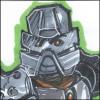As a kid, I grew up seeing Shakespeare as a bit of a rite of passage. I knew he had a propensity for wordiness (exacerbated by the sheer time differential in the years that have passed since the Bard wrote his last), and my one and only encounter with similarly loquacious literature (the opening chapters of The Hobbit) in November of my fourth grade year averted me from any writer who chose to couch their ideas in language I considered overwrought.
Now look at me; I completely unironically wrote a sentence that runs most of that paragraph. How times do change.
In any event, a few years ago, while at my grandmother's house, I saw on the shelf a copy of the complete works of William Shakespeare. Her father, a newspaper editor and wonderful writer in his own right, had acquired the volume (along with a great many other classics) in the mid-1930s. Some time later in his long life, he appeared to have read a good deal of it; I found one of his classic makeshift bookmarks in the middle of Act IV of The Merchant of Venice.
The book was pristine, and a going-over revealed that it was probably as good an edition as any published today, including I borrowed the book for however long it'd take my mom and I to read the complete works.
It was audacious indeed, and no small task to read such prose. So we devised a plan: for each scene, one of us would play half of the characters, and then read through each play at the kitchen table. These characters transform over the course of the play into their own individual voices, often impressions; so far, I've played characters as Morgan Freeman, Mrs. Dubcek from 3rd Rock from the Sun, and an overly Scottish fellow who freely inserts references to haggis at every available opportunity.
The Comedy of Errors, early, short, and full of puns and slapstick, was an obvious first choice based on its description alone. When the lines and stage directions got so funny that we both had to stop for fear of laughing ourselves into unconsciousness, we knew that we'd made a good decision.
The comedies continued with The Tempest, a marked stylistic contrast, and then through plays famous and obscure, ending with The Winter's Tale, of which I remember remarkably little save for the stage direction "exit, pursued by a bear." The histories, full of as much political intrigue as any modern miniseries, lasted for quite some time.
The tragedies have been some of the most fun plays to read, as comedic bits come in at the least expected moments. Some of the earlier tragedies have a farcical or satirical tone; Titus Andronicus, with its "yo momma" jokes and Kill Bill-esque mass atrocities, can be taken as nothing a parody. Similarly, Troilus and Cressida parodies the ancient Greek myths, although the humor is lost on modern-day audiences where Hector, Ajax, and the crew are no longer hip pop culture references.
And that's what's really struck me about Shakespeare: there's inevitable variety of style. Everyone reads Hamlet in high school, just as everyone reads The Great Gatsby. And while Hamlet is a wonderful play, I think it would serve students just as well to go beyond the Prince of Denmark or the feuding Montagues and Capulets. Not every work is a masterpiece—The Two Gentlemen of Verona, for one, is just terrible—but Shakespeare is worth much more exploration beyond what is stereotypically required.
At the heart of it all is that the plots and characters represent things so fundamental about the human experience that they have stood the test of time. They have gained popularity while the work of his his Elizabethan contemporaries are now known primarily to academics. They provide for endless adaptation, just as Shakespeare himself adapted many well-known stories to suit his own ends.
So now I've read the complete plays. What now?
Well ... he wrote a bunch of poetry, too.
On to the sonnets.
-
 1
1



2 Comments
Recommended Comments